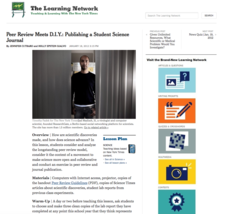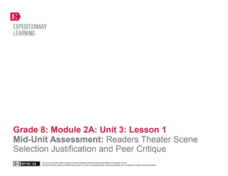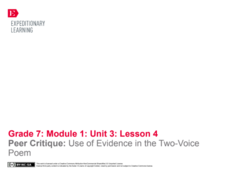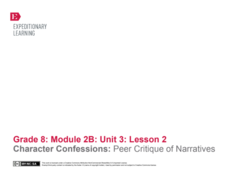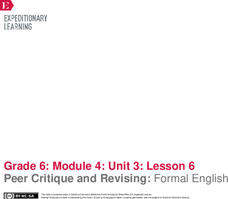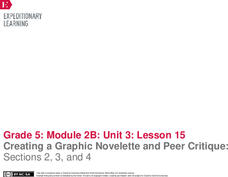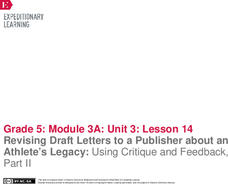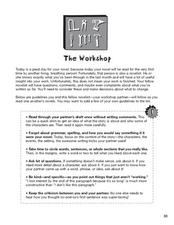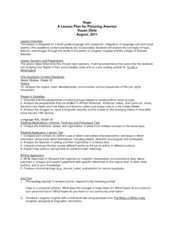Curated OER
Peer Review Meets D.I.Y.: Publishing a Student Science Journal
Peer review of science laboratory reports? You bet! First, learners work in pairs to review a scientific article. Then they trade lab reports for peer review. The end result is the publication of a classroom scientific journal!
EngageNY
Mid-Unit Assessment: Readers Theater Scene Selection Justification and Peer Critique
Is it justified? Readers complete the mid-unit assessment to justify their reader's theater scenes and quote choices from To Kill A Mockingbird. After completing the assessment, scholars conduct peer reviews and critique the script...
EngageNY
Peer Critique and Revision: Editorial Essay
Get those red pens ready! Using the Peer Critique protocol, scholars provide and receive feedback on their editorial essay drafts. They then use class time to work on revisions.
EngageNY
Final Performance Task: Critique and Revision, Part I
Let's work together! Scholars engage in the peer editing protocol, giving and receiving feedback on their draft opinion speeches. They then use classmates' feedback to begin working on their revisions.
EngageNY
Peer Critique: Use of Evidence in the Two-Voice Poem
Peer editors review critique expectations before offering feedback on each other's two-voice poems. They record their feedback on peer critique recording forms, and then begin revising their poems.
EngageNY
Character Confessions: Peer Critique of Narratives
Shake up the writing process with a peer critique. The second of four lessons in the Grade 8 ELA Module 2B, Unit 3 series first has young writers compare their interpretations of a scene from William Shakespeare's A Midsummer Night's...
EngageNY
Writing an Argumentative Essay: Peer Critique
Writing is all about progress, not perfection. Scholars engage in a peer critique protocol to gain feedback on their quote sandwich from a previous lesson. Next, pupils begin drafting their argumentative essays based on the novel Lyddie...
EngageNY
Writing and Argument Essay: Peer Critique with Rubric (Chapters 29-31, Including Synthesis of Scenes in Previous Chapters)
Hungry? Try a quote sandwich! Writers discover the concept of using a quote sandwich to introduce and analyze a quote in an argumentative essay properly. Additionally, pupils engage in peer critiques, analyzing each other's drafts and...
EngageNY
Peer Critique for Organization and Style
Put another set of eyes on your class's historical fiction narratives with one of the final lessons in the unit. Fourth graders use feedback from their peers to annotate their drafts for revision, particularly their bold beginnings and...
EngageNY
Peer Critique of “Inside Out” and “Back Again” Poems
Class members closely examine the use of words in the poems "Inside Out" and "Back Again" to determine if different words would create more powerful poetry. They then conduct peer reviews of the poems they created and offer suggestions...
EngageNY
Peer Critique and Revision: Storyboard, Sections 1-4
Teamwork makes the dream work. Pupils participate in a peer critique process, using forms to offer constructive advice about each other's storyboards. Next, scholars revise their storyboards based on the feedback, and then share their...
EngageNY
Revising Draft Letters to a Publisher about an Athlete’s Legacy: Critique and Feedback, Part I
Pick a corner, any corner! Pupils use the Four Corners strategy and Peer Critique protocol to assess one another's draft letters to a publisher about an athlete's legacy. Scholars then use peer feedback to revise their letters.
EngageNY
Peer Critique and Revising: Formal English
Dear Sir or Madam: What's the difference between formal and informal language? Scholars focus on using formal English and transitions in their position papers. After revising their rough drafts, they engage in the peer editing process...
EngageNY
Creating a Graphic Novelette and Peer Critique: Sections 2, 3, and 4
Let's get creative! With the fun resource, pupils continue working on their graphic novelettes about an invention, adding text and images to each section. When finished, they engage in a peer critique process, giving and receiving...
EngageNY
Revising Draft Letters to a Publisher about an Athlete’s Legacy: Using Critique and Feedback, Part II
Let's get opinionated. Scholars participate in a peer critique and revision process using a fun activity called a Four Corners strategy. After incorporating classmates' feedback, individuals share their final drafts of their opinion...
EngageNY
Performance Task Preparation: Peer Critique and Mini-Lesson Addressing Common Errors: Revising Draft Essay to Inform
Time to revise! Using a writing evaluation rubric, scholars participate in a peer editing process to provide feedback on each others' informative essays. Next, pupils begin revising their drafts based on the feedback they receive.
EngageNY
Writing, Critique, and Revising: Two-Voice Poems (Chapter 14: "Las Ucas/Grapes")
Continue work on the two-piece poem that compares two characters from Esperanza Rising. Give class members a few minutes to finish their drafts. After they have a complete product, model how to critique and edit the poems with one group....
EngageNY
Peer Critique and Pronoun Mini-Lesson: Revising Draft Literary Analysis
See what peers really think. Scholars give a peer critique of the their essay drafts from the previous lesson. They then participate in a mini lesson about pronouns. Pupils write examples of each type of pronoun on sticky notes and put...
Curated OER
The Workshop
Kids take a critical look at each other's work in order to understand the editing process while providing constructive suggestions. This handout really sets learners up to successfully offer constructive critique to their peers. Helpful...
Curated OER
Creating and Using a Checklist of Performance Techniques to Critique and Find the "Message" in Mass Media Performances
Students analyze and critique theater events by evaluating and constructing meanings from improvised and scripted scenes and from theater, film, television, and electronic media productions.
Curated OER
Picturing America: Images and Words of Hope from Romare Bearden and Langston Hughes
A carefully crafted three-day lesson integrates poetry and visual art. By analyzing and comparing Langston Hughes' poem "Mother and Son" and Romare Bearden's collage "The Dove," readers explore the theme of hope. The lesson activates...
EngageNY
Peer Critique: Historical Accuracy of Ideas and Vocabulary
Promote collaboration in the classroom with a historical fiction instructional activity. Fourth graders partner up and read the other's narrative to give feedback on vocabulary choice and the accuracy of historical information. After...
EngageNY
End of Unit 2 Assessment: Final Literary Analysis
Get ready to review and revise! Scholars peer edit each other's literary analysis essay drafts. Next, using peer and teacher feedback, pupils compose their final drafts.
Curated OER
Peer Editing
Sudents read and critique three of their fellow classmates' science fiction short stories on three consecutive days for mechanics, short story elements, style, and informational elements.


